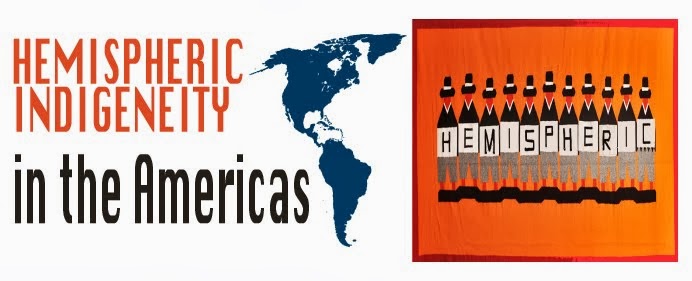Waskar Ari (Assistant Professor of History, University of Nebraska-Lincoln) is an Aymara historian of nineteenth- and twentieth- century Latin America. He is the author of, Earth Politics: Coloniality, Religion and Bolivia’s AMP Indigenous Intellectuals, 1921-1971 (Duke UP, 2014). His work explores the relationship between the nation-state and indigenous peoples. His work particularly emphasizes issues of race, ethnicity, gender, and sexuality. He is currently working on four new projects: 1) A study of indigenous women, land tenure, and civil rights in the private and public spheres from 1825 to 1971. 2) A history of Bolivian sexualities that will address homosexuality and heterosexuality between 1930-1980 by exploring specific cases in indigenous communities during a time when Bolivian patriarchy was being restructured. 3) A study of the young Evo Morales in the period from 1953 to 1979 that emphasizes the history of post-revolutionary Bolivia, global politics, and the Cold War, and 4) a comparative study of the Indian leaders Pablo Zarate Willka (1850-1905) in the Andes and Standing Bear (1834-1908) in the Great Plains. This comparative project will explore the making of alternative public spheres, ideas about citizenship, and their appropriation by North American Indians and South American indigenous peoples.
jueves, 9 de enero de 2014
miércoles, 8 de enero de 2014
Hemispheric Indigeneity in the Americas is a multidisciplinary seminar that will explore issues about decoloniality, discursive practices, indigenous knowledge production, sovereignty, and narratives of nature within a globalized framework. In addition, we will also problematize Romance Studies (Spanish in particular) and its (de)colonial relation to indigenous languages and knowledge production. We believe that the significance of this seminar lies in bringing to floor a fundamental and necessary transdisciplinary discussion to our initiative that will allow us to reflect on the state of Indigenous peoples within and outside the academy, and the Humanities in general.
Tentative Schedule
(Room TBA)
-Thursday 13. Two sessions. 3-4:30 and 5-6:30. Participants present their work. 15-20min. each, followed by Q/A session.
Introduction: Emilio del Valle Escalante (K’iche’ Maya), UNC-Chapel Hill
Simon Ortiz (Acoma Pueblo), Arizona State University
Irmalicia Velasquez Nimatuj (K’iche’ Maya), Executive Director of the Support Mechanism for Indigenous Peoples Oxlajuj Tz´ikin (Guatemala)
Waskar Ari (Aymara) University of Nebraska, Lincoln
Moderator: Chris Teuton (Cherokee), UNC-Chapel Hill
—30min coffee break—
Jolene Rickard (Tuscarora), Cornell University
Luis Cárcamo Huechante (Mapuche), University of Texas at Austin
Mario Blaser, Memorial University
Moderator: Arturo Escobar / Todd Ochoa, UNC-Chapel Hill
-7:30: Simon Ortiz presentation/reading of his work.
Location TBA.
-Friday 14. 3-5:30pm, Hyde Hall, UNC-Chapel Hill. Discussion with participants based on readings of their works, and other relevant readings. A set of questions will be developed that we will use as points of departure for an informal discussion related, but not limited to hemispheric indigeneity, decolonization, narratives of nature, the role of romance languages/studies in (de)colonial practices.
Irmalicia Velasquez Nimatuj (K’iche’ Maya)
Waskar Ari (Aymara)
Jolene Rickard (Tuscarora)
Luis Cárcamo Huechante (Mapuche)
Mario Blaser
Walter Mignolo, Duke University
-6:30pm. Dinner with participants. Location TBA.
-Saturday 16. Participants departure.
_________________________________________________________
This event is being organized by the UNC-Chapel Hill Romance Languages Department in collaboration with friends/scholars from other units within the college of Arts and Sciences: Arturo Escobar (Anthropology), Todd Ochoa (Religious Studies), and Chris Teuton (American Indian Studies). Besides Romance Languages, Anthropology, Religious Studies and American Studies, this event has been sponsored by:
UNC-CH’s Institute for the Arts and Humanities, American Indian Center, the Institute for the Study of the Americas, Sonja Haynes Stone Center for Black Culture and History , UNC-CH / Duke’s Abya Yala Working Group, the Relationality Working Group, Duke’s Center for Caribbean and Latin American Studies, and the Romance Studies Department at Duke.
Special thanks to the following individuals for this event:
Federico Luisseti, Juan Carlos González Espitia, Oswaldo Estrada, Sam Amago, John McGowan, Louis Perez, Miguel Rojas Sotelo, Arturo Escobar, and FLC.
Suscribirse a:
Entradas (Atom)

